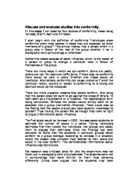REM sleep is essential. Dement (1960) conducted a study to support this. He used 8 participants over several nights. They were attached to an EEG which allowed Dement to wake up one group when they entered REM. The REM deprived group of participants became agitated, anxious and unable to concentrate, and after several nights entered REM on falling asleep. The amount of times they had to be woken per night rose from 12 to 26 by the seventh night. When they slept normally they showed the rebound effect in which they spent up to 50% longer in REM. This suggests that REM is indeed essential. It is needed in order for a person to remain psychologically alert and lack of REM affects their personality. The fact that the participants spent longer in REM when allowed to sleep normally shows that REM is needed for a person to function.
However, evidence against this study is that sufferers from the condition ‘fibrositis’ experience disruption to their SWS sleep. They wake up in the morning feeling just as tired as when they went to bed. This goes against Dement as it shows that even though the sufferers were getting a normal amount of REM, they still were just as tired. This suggests that SWS could be just as important as REM.
REM sleep must be recovered if we are deprived of it. The case study of Randy Gardener supports this. Gardener, 17, managed to stay awake and alert for around 264 hours. It was found that although Gardener had blurred vision and incoherent speech in addition to a mild degree of paranoia, he did not suffer from psychosis, which is a complete breakdown of mental functioning. He slept for 14 hours afterwards and reported no negative effects from his deprivation. Gardener never recovered more that 25% of the sleep that he had lost, yet he did however recover almost 70% of stage 4 sleep and 50% of REM sleep. The fact that he suffered from incoherent speech and mild paranoia suggests that a person cannot function adequately without sleep. Another assumption that can be made is that not all stages of sleep are important. Gardener recovering more stage 4 and REM sleep suggests that these two stages are the most important to a human.
This case study is not without its problems, though. Because this is a case study, it is restricted. This means that there are issues with individual differences. What is the case for one person may not be the case for another; therefore the findings from Gardener’s sleep deprivation may not be the same as other persons. This makes it unrepresentative data therefore impossible to generalise to the public.
Sleep is needed to stay alive. Jouvet conducted a study into total sleep deprivation involving cats. He placed the cats onto upturned flowerpots which were surrounded by water so that there was no possibility of the animals escaping. The cat would eventually fall asleep and would pass into REM. The muscle tone loss experienced during REM caused the cats to slip off the flowerpot and they soon learned to awake whenever its head began to nod. Over a period of time, the animals became deprived of sleep in general, but REM in particular. The cats experienced abnormal behaviour and eventually death. This shows that sleep is needed to stay alive and to keep psychological health. The abnormal behaviour shown by the cats suggest that the lack of sleep was causing them to psychologically malfunction, and it seems eventually led them to their deaths.
One problem with this study is that it suffers from extrapolation. This means that the study involved only animals as the participants, therefore the findings from the study cannot be generalised to humans as animals and humans are completely dissimilar.







